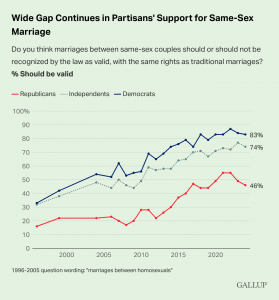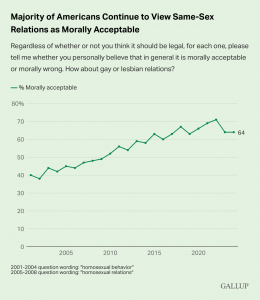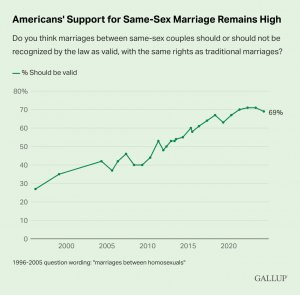After reaching an all-time high of 55% in 2021 and 2022, Republican support for same-sex marriage fell to an all-time low of 46% in 2024, even among the party’s youngest voters.
This was true for a June Gallup poll and an earlier one from Public Religion Research Institute. Surprisingly, the polls also revealed that, although support remains high among the general population, overall support for same-sex relations fell, from 71% in 2022 to 64% in 2023.
The renewed right-wing campaign against the LGBTQ community is responsible, according to those who study the data.
 Gallup began tracking Americans’ opinions on same-sex marriage in 1996. At that time, only 27% of the population thought such marriages should be legal. In the years leading up to the U.S. Supreme Court’s 2015 decision legalizing same-sex marriage nationwide, public opinion had been rapidly advancing in favor of the unions.
Gallup began tracking Americans’ opinions on same-sex marriage in 1996. At that time, only 27% of the population thought such marriages should be legal. In the years leading up to the U.S. Supreme Court’s 2015 decision legalizing same-sex marriage nationwide, public opinion had been rapidly advancing in favor of the unions.
By the time of that landmark ruling, nationwide support soared to 61%. While Republican support always has lagged 30 points behind that of Democrats, even it has trended steadily upward until recently.
Not only has Republican support for same-sex marriage fallen, but so has the party’s support for laws protecting LGBTQ citizens from discrimination in housing (66% to 59%) and by small businesses (40% to 34%).
PRRI interviewed 22,000 adults for its American Values Atlas survey and found support for same-sex marriage and nondiscrimination protections for gay Americans had fallen across the board for the first time since they began surveying public attitudes a decade ago.
Melissa Deckman, CEO of PRRI, explained the extent of the survey in an interview with PBS: “One great thing about the AVA is we also have enough data to look at opinions in all 50 states. But essentially, we get a snapshot of all Americans, including people of faith and people who are unaffiliated.”
Declines of two percentage points in support for same-sex marriage and four points for antidiscrimination legislation may seem insignificant, but they are concerning to Deckman.

Melissa Deckman
“Generally, there has been a growing increase in support among Americans,” she explained. “And part of that is a reflection of the fact that more Americans, especially younger Americans, are identifying as LGBTQ.”
From 2016 onward, the share of those under age 30 identifying within the LGBTQ umbrella has increased 15% in blue states and battleground states and by more than 10% in red states.
In a time of increased identification, Deckman believes conservative backlash is to blame for a downturn in support for gay rights. Immediately after Obergefell, the Supreme Court case, Republicans shied away from vocal anti-LGBTQ rhetoric because it became a losing issue at the ballot box. However, the rise of Christian nationalism within the Republican Party has made the opposition to gay rights palatable again.
According to Deckman, “Americans who have a tendency to support Christian nationalism are far less likely to support the rights of LGBTQ Americans, in part because of the theological opposition to the idea of homosexuality and being queer to begin with.”
This negative correlation holds true across all 50 states.
 Christian nationalist advocacy organizations like the Alliance Defending Freedom, the National Christian Foundation , the Heritage Foundation, and the Family Research Council have helped fan the flames of the reignited culture wars. Between 2016 and 2020, the combined contributions to 11 nonprofit groups the Southern Poverty Law Center identifies as anti-LGBTQ hate groups have risen from $87 million to $110 million.
Christian nationalist advocacy organizations like the Alliance Defending Freedom, the National Christian Foundation , the Heritage Foundation, and the Family Research Council have helped fan the flames of the reignited culture wars. Between 2016 and 2020, the combined contributions to 11 nonprofit groups the Southern Poverty Law Center identifies as anti-LGBTQ hate groups have risen from $87 million to $110 million.
Funded by undisclosed donors through donor advised funds, these groups have funneled millions into campaigns for anti-LGBTQ legislation. The ADF gave $85,000 of the $25 million in donations it received between 2020 and 2021 to the Child and Parental Rights Campaign, a group that helped craft Florida’s “Don’t Say Gay” bill and $50,000 to County Citizens Defending Freedom USA working to ban LGBTQ books in Florida schools.
The millions Christian nationalists are investing in anti-LGBTQ advocacy and propaganda is paying off. According to the ACLU, in 2023 the total number of anti-LGBTQ bills introduced in state legislatures was 510, which at the time was three times the number of such bills introduced the year before. The ACLU is currently tracking 527 anti-LGBTQ bills making their way through state houses across the country.
The influx of Christian nationalist cash is paying off for conservatives in another way as well.
“If you look at young Americans’ attitudes about same-sex marriage in 2020 among Republicans, two thirds supported same-sex marriage rights. But in last year’s data among young Republicans aged 18 to 29, it’s less than half. That’s a really big cratering of support,” Deckman said.
Political analysts have long assumed younger Republicans, over time, would moderate the party on issues like LGBTQ rights and climate change; but the data now tell a different story.
“We’re finding in this data … that younger Republicans are very conservative socially.”
“There has been this assumption that as we become more, I think, accepting of LGBTQ Americans in our daily lives, that it would just naturally lend itself to people being more supportive of protecting the rights of LGBTQ Americans,” Deckman said. “We’re finding in this data … that younger Republicans are very conservative socially.”
At the Republican National Convention, the GOP revised its official platform, removing a formal statement against same-sex marriage. Charles T. Moran, president of the conservative LGBTQ group Log Cabin Republicans, welcomed the change and the removal of “outdated and out-of-step language.” He credits the hard work of LGBTQ advocates within the GOP who’ve been pushing for a more inclusive party.
Others are more skeptical and see the platform revision as a means of attracting undecided voters. Project 2025, the Heritage Foundation’s blueprint for a second Trump administration, remains steadfastly against same-sex marriage. And conservative evangelicals have publicly criticized the platform for no longer addressing same-sex marriage.
 Although the GOP removed the prohibition, the party’s platform still proposes strong measures against trans individuals, vowing to “keep men out of women’s sports, ban taxpayer funding for sex change surgeries, and stop taxpayer-funded schools from promoting gender transition.”
Although the GOP removed the prohibition, the party’s platform still proposes strong measures against trans individuals, vowing to “keep men out of women’s sports, ban taxpayer funding for sex change surgeries, and stop taxpayer-funded schools from promoting gender transition.”
The GOP’s anti-trans rhetoric is intentional. After the SCOTUS decision in Obergefell v. Hodges that legalized same-sex unions, the party needed a new issue to galvanize voters and donors.
Terry Schilling, president of the American Principles Project, a social conservative advocacy group, told the New York Times, “We knew we needed to find an issue that the candidates were comfortable talking about, and we threw everything at the wall.” Transgender identity, especially with regard to young people, proved to be the “winning” issue.
When “bathroom bills” failed to motivate voters, Schilling’s group found success by advocating for a ban on transgender athletes participating in girls’ sports. This they then used as a wedge to push for other anti-trans legislation, such as denying medical care to transgender minors.
A 2022 PRRI survey showed the public at large less likely to support transgender rights than same-sex or abortion rights. Earlier this year New Hampshire Democrats voted with Republicans in the House on a bill restricting transition health care for youth. This month, Gov. Chris Sununu signed it into law.
With little resistance from the other side, Republicans are now branching out from laws concerning children and teens to passing anti-trans laws that impact adults. Their success with this legislation has emboldened the party’s conservative Christian nationalists to press forward with their anti-LGBTQ agenda.
“When ‘bathroom bills’ failed to motivate voters, Schilling’s group found success by advocating for a ban on transgender athletes participating in girls’ sports.”
Nevertheless, Deckman remains optimistic about the future rights of the LGBTQ community.
“Despite these declines that we’ve seen, the vast majority of people of faith continue to support the rights of LGBTQ Americans, especially with respect to same-sex marriage and nondiscrimination laws,” she said.
There is concern, however, that the current Supreme Court might overturn a previous court’s decision in Obergefell, just as it did the decision granting abortion access in Roe v. Wade. Justice Clarence Thomas, who dissented in the 2015 case, indicated he thinks the court “should reconsider” Obergefell and “correct the error.”
The Biden administration passed the Protection for Marriage Act, which requires states to recognize same-sex unions, but it does not compel them to issue marriage licenses to couples if the Supreme Court were to reverse Obergefell. If that happens, the dormant laws prohibiting same-sex marriage still on the books in 35 states would become enforceable again.
“There’s now a conservative majority on the Supreme Court. And there’s indication that the rights of same-sex marriage are going to be on the line,” Deckman said. “You’re going to have legal challenges from conservative groups, (that) are going to be fighting to roll back those rights.”
She sees the survey results as “a good reminder not to take such rights for granted. It’s going to take political organizing. Elections have consequences.”
Related articles:
Divorce, double standards and debates on same-sex marriage | Opinion by Ryan Self
Weekly churchgoers are now the primary holdouts against same-sex marriage
The Respect for Marriage Act helped de-escalate the culture wars | Opinion by Tanner Bean


